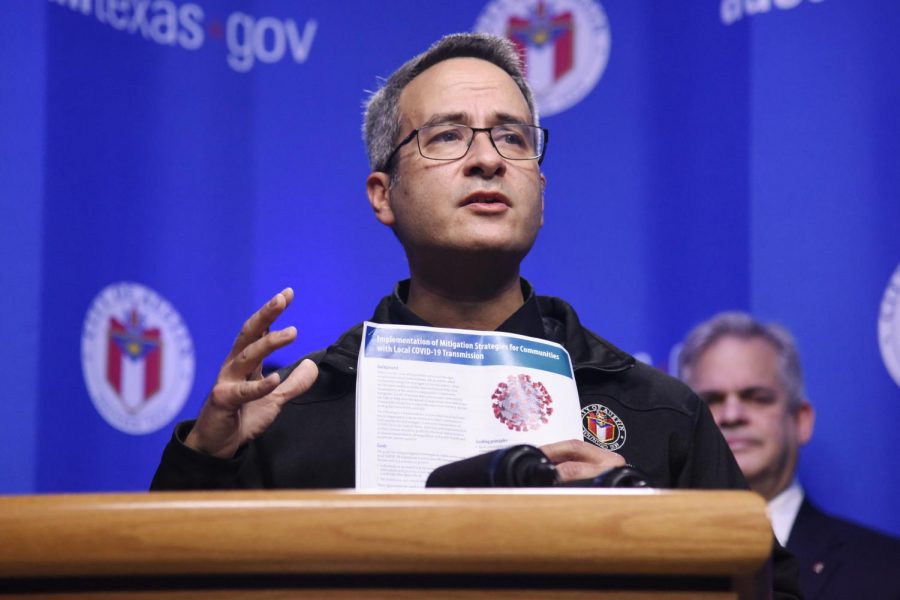Austin Public Health officials encourage safety precautions during Easter weekend, registering for COVID-19 vaccine
March 31, 2021
Austin Public Health officials advised people Wednesday to continue COVID-19 safety precautions going into Easter weekend by avoiding large gatherings and to continue trying to sign up for vaccinations.
“This is a time where we want to celebrate … but we’re at a time where we have to be careful,” said Mark Escott, the interim Austin-Travis County health authority. “That means we have to stay the course. We have to maintain the protections and get through this holiday without costing people’s lives.”
Currently, COVID-19 cases in Austin are continuing at a flat rate, Escott said, but the effect of spring break remains to be seen, and the Easter holiday could cause an increase in cases.
APH is currently receiving 12,000 first doses and 12,000 second doses per week of the Moderna vaccine, said Cassandra DeLeon, APH chief administrative officer for disease and health promotion. All vaccinations must be scheduled by appointment, and people can preregister online to be added to a waitlist to receive an appointment.
UT students and community members can register for vaccinations through UT Health Austin by filling out a vaccination request form online. Patients are required to provide basic personal information, and vaccines are administered by appointment only.
DeLeon said APH alone has vaccinated over 180,000 people in Austin from Jan. 11 to March 31. However, people can seek vaccines at outside providers and clinics.
“We do anticipate that the federal government (and) the state will increase allocations to providers outside of APH to help with (vaccine accessibility),” Escott said.
As people continue to be vaccinated, Escott said Austin may be able to decrease its COVID-19 risk to Stage 2 as early as the third week of April. Austin is currently in Stage 3.
Stage 3 risk encourages all individuals to avoid gatherings larger than 10 people and recommends businesses operate at 50-75% capacity. Stage 2 risk encourages individuals to avoid gatherings larger than 25 people and recommends businesses operate at up to 75% capacity.
“If we stay the course, if we continue to isolate and … get tested, then it is feasible by summer we’ll be in Stage 1,” Escott said.
Escott encouraged people who are vaccinated to continue wearing masks until herd immunity is achieved, which he said will likely be in late summer or early fall. Currently, 14% of the adult population in Austin is fully vaccinated and 30% in the age group over 16 have received a first dose, Escott said.
“We will get to 50-60% (population immunity) relatively quickly,” Escott said. “The question is how long it will take to get to 60%, 85% or 70%. Herd immunity is not a fixed location; it is mobile based on transmission of the disease.”
Residents who receive a vaccine through APH should automatically be scheduled for a second appointment for their next dose before the recommended 28-day period. If they have questions or are not scheduled, DeLeon said they should call 311.
One issue with achieving herd immunity is the ability for children to get vaccinated, Escott said. Until dosage amounts are approved for children under 12 and the population of children aged 12-15 is more widely vaccinated, herd immunity cannot be fully achieved in Austin. Escott said APH hopes vaccinations will expand to these groups in the summer.
Pfizer-BioNTech announced Wednesday that their vaccine is well-tolerated and up to 100% effective in children aged 12-15.
DeLeon said APH does not require people to present an ID at vaccination sites, and there is Spanish language assistance at these sites. These measures will hopefully help patients with accessibility and comfort when receiving the vaccine, DeLeon said.
As the spring allergy season continues, Adrienne Sturrup, APH assistant director for health equity and community engagement, encouraged people to get vaccinated if they are feeling sick as a safety precaution.



